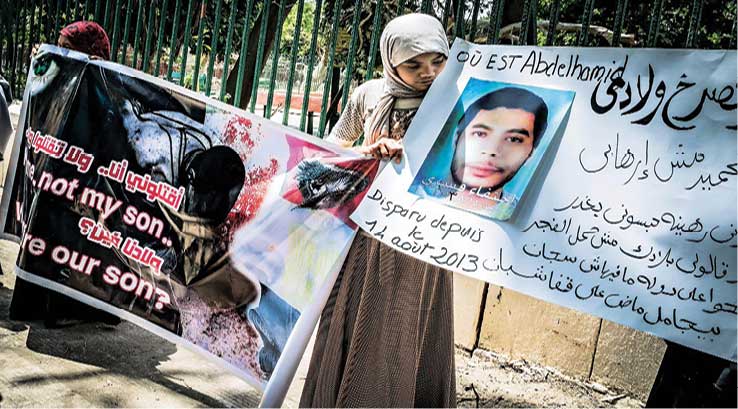
In 2016, we submitted to the UN Mechanisms 112 communications regarding 68 individuals.

EGYPT
 Our Concerns
Our Concerns
- Institutionalisation of the practice of enforced disappearance;
- Arbitrary detention and proceedings against civilians before military courts;
- Death sentences pronounced as a result of unfair trials and summary executions;
- Adoption of drastic laws to stifle any form of dissent, expression, peaceful assembly and political opposition;
- Excessive use of force against real and alleged political opponents and demonstrators, and ill-treatment and torture upon arrest and in detention.
 Recommendations
Recommendations
- Ratify the International Convention for the Protection of all Persons from Enforced Disappearances and abolish this practice;
- Amend legislation on torture and ensure that it is in conformity with international standards and submit its overdue report to the Committee against Torture;
- Abolish the emergency legislation allowing for the prosecution of civilians before military courts;
- Apply all fair trial guarantees;
- Guarantee the rights to freedoms of expression, association, and peaceful assembly.
 Upcoming
Upcoming
- March 2017: Review of the National Council for Human Rights before the Sub-Committee on Accreditation of the Global Alliance of National Human Rights Institutions;
- 25 June 2017: 13-year delay in the submission of Egypt’s initial report to the Committee against Torture (initially due in 2004);
- 1 November 2017: 13-year delay in the submission of Egypt’s initial report to the Human Rights Committee.
Despite the Parliamentary elections held in late 2015, as well as the promises made by the Egyptian government to enhance fundamental rights and freedoms, 2016 saw a further increase in human rights violations across the country, demonstrating the State’s lack of commitment to engaging in meaningful reforms.
In January 2016, the newly elected Parliament was quick to approve flawed laws, including the 2015 Anti-Terrorism Law and the Law on the “protection of vital and public facilities”, which allows the referral of civilians to military courts. Having been previously issued by the executive power, in the absence of a Parliament, sparking considerable criticism from NGOs. New oppressive laws were also promulgated, further jeopardising the rule of law and undermining fundamental freedoms in the country. Notably, in November 2016, the Egyptian Parliament passed a new draft NGO law, further restricting the right to peaceful assembly and association. In December, a new media law was ratified. It foresees the creation of a Supreme Council for the Administration of the Media – whose Chairman will be nominated by the president – which can revoke licences for foreign media and fine or suspend publications and broadcasters, thus seriously infringing on freedom of the press.
It is within this legal framework that rampant human rights violations have continued to occur throughout the year. In Sinai, where a state of emergency is still in place, the Egyptian military and law enforcement agencies have resorted to indiscriminate violence, torture, extrajudicial executions, as well as arbitrary arrests of alleged “terrorists”. While the 2015 Anti-Terrorism Law was used to justify violent crackdowns on dissenting voices, journalists and political opponents, Egyptian security services have also arbitrarily arrested and detained peaceful demonstrators throughout the country, under the pretext of preserving “State security”. Equally, the renewal of the Law on the “protection of vital and public facilities” has allowed for the referral of civilians to military courts, subjecting individuals to unfair trials given the lack of impartiality exercised by these jurisdictions the admission of confessions obtained under torture. Human rights defenders and NGOs have been victims of the authorities’ systematic crackdown, through the freezing of their assets, the issuance of travel bans, arbitrary detention, and the suspension of their activities.
The aforementioned violations have prompted various UN human rights mechanisms to issue statements calling on the Egyptian government to adopt urgent measures to address the situation. With regard to the new NGO Law in Egypt, the UN Special Rapporteur on the rights to freedom of peaceful assembly and of association observed that “this bill proposes perhaps the worst restrictions on fundamental freedoms in Egypt since the 2011 uprisings” and that “it aims to destroy Egypt’s foundation for peaceful, civic engagement at its very roots. If it becomes law, it would devastate civil society not only in the short term, but possibly for generations to come”.

A steady increase of enforced disappearances
The practice of enforced disappearances perpetrated by State actors has been on the rise throughout the year, reaching alarming and unprecedented levels. While the Egyptian authorities continue to deny their involvement in the abduction of thousands of individuals, Alkarama has reported many such cases based on the accounts of witnesses and families of victims.
The scale of this phenomenon prompted the UN Working Group on Enforced Disappearances to highlight this issue in its July 2016 annual report. The experts expressed extreme concern over the fact that during the reporting period, “it transmitted 131 new cases under its urgent action procedure to the government in relation to what seems to be an increasing pattern of disappearances”.
The majority of enforced disappearances documented by Alkarama follow the same pattern. Victims are typically arrested without a warrant, held in secret detention by the security forces, the intelligence services, the army or the police, and subsequently tortured to extract confessions that are then used as evidence to convict them at trial. Some victims reappear in detention facilities at a later stage, are brought before the Prosecutor, and then formally charged in order to formalise their detention. In some cases the date of their arrest is altered in the process. Local authorities systematically deny involvement in these disappearances and refuse to provide the families of the victims with any information on their fate and whereabouts.
This is, for instance, the case of two Egyptian citizens who were forcibly disappeared at the hands of the Egyptian authorities and are still missing to date. Abducted, respectively, on 27 December 2015 in Ain Shams, Cairo, by law enforcement agents, and on 10 September 2014 in El Khanka, El Qalyubia Governorate, by the Homeland Security Services. Their families have tried to locate them but have not received any news so far. Despite their efforts, the Egyptian authorities have denied any involvement in the abduction of these two men and refuse to provide any information on their fate and whereabouts.

Persistent violations of the rights to freedom of expression, of peaceful assembly and of association
In continuity with previous years, the Egyptian authorities have repressed fundamental rights, such as the freedom of expression, of peaceful assembly, and of association.
In April and May 2016, demonstrators gathered in various cities to peacefully protest against the decision of the government to transfer two Red Sea islands – Tiran and Sanafir – to Saudi Arabia. Law enforcement agents used excessive force against peaceful protesters and arrested hundreds of demonstrators that were later charged under the highly restrictive Law No. 107 of 2013 on demonstrations and public gatherings, infamous for having justified serious human rights abuses, including the sentencing of peaceful demonstrators to the capital punishment.
Similarly, in September 2016, the Egyptian government passed a new NGO draft law, raising the concern of both Alkarama and the UN Special Procedures. This law further restricts the financing and activities of associations and NGOs, placing them under the control of the security apparatus and severely limiting their activities to what is vaguely referred to as “Egyptian social needs”. In this respect, 2016 saw the continuous judicial harassment and prosecution of several local NGOs and their founders, who have been arbitrarily accused of “receiving illicit funds” and of “carrying out unlawful activities”. While some of these NGOs were forced to close down, the UN Special Procedures have expressed their concern as to the incessant violations of such fundamental rights, with the UN Special Rapporteur on the promotion and protection of the right to freedom of opinion and expression referring to “an increasing trend of criminalization of expression and imprisonment of journalists”.
Lastly, on 26 December 2016, President Al Sisi ratified a law on the “Institutional Regulation of the Press and the Media”, which established three regulatory bodies to oversee all media outlets. The first two will supervise state-owned press organisations, audio-visual media, and radio, while the Higher Council for Media Regulation will regulate all media outlets. The Directors of these boards will be chosen directly by the president and, accordingly, allow the executive to control the media. The new law falls into a broader pattern of the government crackdown on media workers, seeing numerous journalists arrested and prosecuted, including on allegations of “terrorism and before military courts”.

Summary executions and capital punishment following unfair trials
Extrajudicial executions are amongst the most severe human rights violations in Egypt. In this regard, Alkarama strongly condemned the Egyptian Minister of Justice’s speech of January 2016, which called for the killing of Muslim Brotherhood members and their supporters. Not only do such comments violate fundamental principles of international human rights law – namely article 20 of the International Covenant on Civil and Political Rights, prohibiting any “discrimination, hostility or violence” –, they also constitute a breeding ground for further violations and equally create a climate of impunity for perpetrators. In 2016, Alkarama raised several accounts of suspicious deaths in detention of political detainees, while media outlets exposed several summary executions targeting members of the Muslim Brotherhood, including the killing of a prominent leader of the group, Mohamed Kamal, in the Cairo’s Bassateen neighbourhood. Mr Kamal was allegedly killed in an exchange of gunfire with the police while they were trying to arrest him.
The comments made by the Minister of Justice also violate his legal duty of independence and impartiality and jeopardise the integrity of the judiciary system. In tune with this, many individuals continue to be at risk of being sentenced to death as a result of unfair trials – including before military courts – that are politically motivated.
